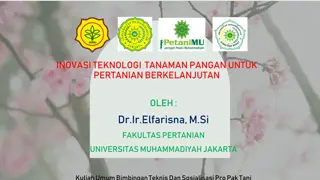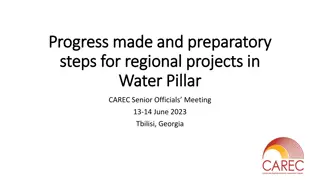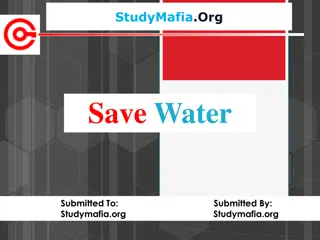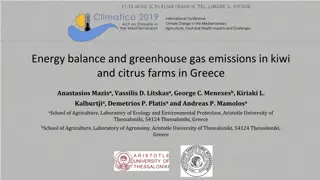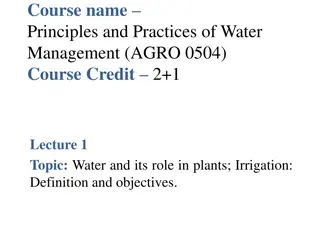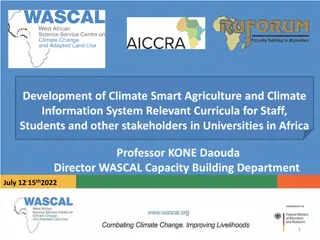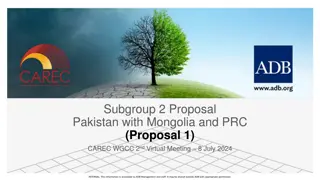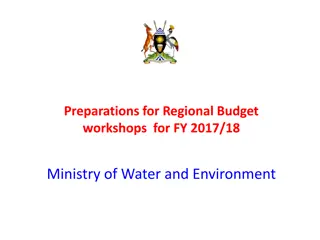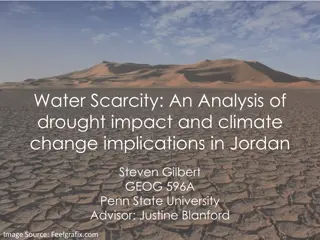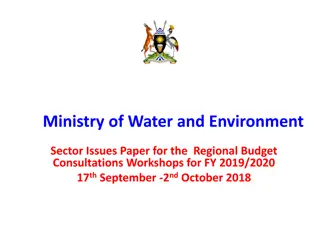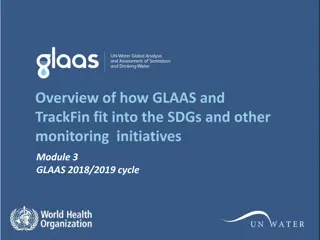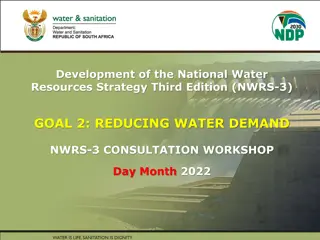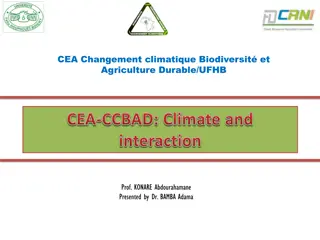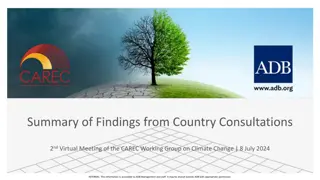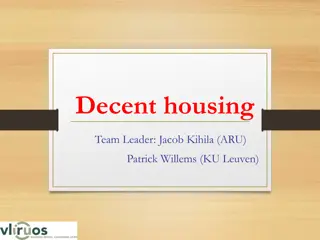Enhancing Sustainable Agriculture Through Tailor-Made Water and Climate Services
Water Systems and Global Change Group at Wageningen University & Research conducted the WATERAPPS project aiming to provide customized water and climate information services for sustainable food production in peri-urban delta areas of Ghana and Bangladesh. The project focused on sharing platforms, virtual communities, weather and climate forecasts, adaptive decision-making, and sustainable agriculture. A case study in Khulna, Bangladesh highlighted the importance of information in managing water and climate risks for farmers. The project involved setting up the WATERAPPS school for co-producing climate services, focusing on the Aman crop season through Farmer Field Schools using ICT platforms for information sharing.
Download Presentation

Please find below an Image/Link to download the presentation.
The content on the website is provided AS IS for your information and personal use only. It may not be sold, licensed, or shared on other websites without obtaining consent from the author. Download presentation by click this link. If you encounter any issues during the download, it is possible that the publisher has removed the file from their server.
E N D
Presentation Transcript
Water Systems and Global Change Group (WSG) Wageningen University & Research (WUR) spyros.paparrizos@wur.nl
WATERAPPS project 2016-2021 Aim Provide tailor-made water and climate information services with and for farmers for sustainable food production in peri-urban delta areas in Ghana and Bangladesh. Ada, Ghana Khulna, Bangladesh 2 Source: WaterApps website
WATERAPPS: main research question Sharing platforms & virtual communities Weather & climate forecasts Combine & leverage Adaptive decision-making Sustainable agriculture 3
STUDY CASE: Khulna, Bangladesh Tailor-made water and climate information services for sustainable agriculture in peri- urban Ganges Delta of Bangladesh 5
Bangladesh study case - Background 40% of households -> crop farming Farmers are dependent on seasonal rainfall and other weather phenomena to make decisions Beginning: Farmers had limited access to information Available information and technology can help farmers manage water and climate risks and harness opportunities 6
Preliminary analysis - needs assessment - Quality of information: Poor - Main sources: Peer farmers & TV programs Time in advance Information needs 7
Co-development of CIS Setup: WATERAPPS school (Farmers Field School FFS) - Scope: Tailor/co-production of climate services - Crop season: Aman (rainfed season in Bangladesh) - Farmer field schools (FFS): 2 villages (32+26 ppl) - Communication mode: Sharing forecast information using ICT-platforms (messenger) + paper based (FFS) 8 Forecast source: meteoblue
Face2Face in the Farmers Field School Weekly session with three tasks: 1st30 min feedback session 2nd30 min forecasts sharing and discussion 3rd30 min preparation of weekly advice for farmers Female farmers sharing weekly agricultural advice and information that was developed by themselves 9
Evaluation first outputs Facebook groups Time in advance Information needs 10
Improved livelihood outcomes Increased economic output Improved crop management practices Knowledge and awareness on forecast information Increased trust and dependency on scientific forecast (SF) Combined use of SF and local forecast knowledge (LFK) Appropriate decision on time Improved social relations and acceptance 11
Improved livelihood outcomes Increased leadership Positive role in women empowerment Her story Farmer explaining the forecast to the school participants Participants of the WATERAPPS school discussing agricultural activities in relation to the forecast 12
Weather Club in Khulna, Bangladesh Farmers initiative: establishment of a Weather Club at Sanchibunia village with the support of the WATERAPPS WATERAPPS PhD student Mr. Uthpal Kumar (right) with local farmers Local farmers constructing the Weather school in Khulna with the support of the WATERAPPS Source: Weather club - WATERAPPS 13
EXAMPLE 2: Ada East District, Ghana Co-production of meteorological information for vegetable farmers in Ghana using seasonal forecasts and digital tools 14
Field implementation Co-learning: Farmers measure rainfall Co-learning: Farmers interact WATERAPPS PhD student Ms. Rebecca Sarku teaching local farmers how to install and measure rainfall WATERAPPS PhD student Mr. Talardia Gbangou (left) with local farmers on the field Co-learning: Farmers submit observations 16
Integrating Scientific and Indigenous Knowledge in weather forecasting ADDED VALUE! - Gbangou et al. (in review) Farmers Indigenous Forecast Scientific Model Forecast (meteoblue) 17
Output: FarmerSupport APP Climate Service location & time-specific information Scientific Forecast Knowledge (SFK) Local Forecast (LFK) LFK is based on local agro-meteorological indicators 18
WATERAPPS: Take home messages Factors that limit information uptake Long-term traditional practices Lack of understanding and awareness Lack of personal ability/capacity (age, literacy, ICT knowledge) Lack of/bad quality of smartphone Network problem and internet costs Communication gaps due to personal reasons (remoteness) Power relationship Lessons learned Potential for location-time-specific Climate Information Services for sustainable agriculture 2-Way communication is KEY! ICT-based tools is highly preferred by young and educated farmers Social, economic, technological and personal ability limit uptake of forecast information Farmers need capacity building to deal with forecast information and reduce risks Governmental officials have strong network with farmers and could help develop capacity 19
WATERAPPS: Synthesis Source: Nyadzi et al. 2018 20
Thank you! Dank U! Wageningen University, The Netherlands 21
APPENDIX 22
APP proof of concept / implementation - Implement APP on the field in Ada, s. Ghana (postponed/pending...) - Implement APP on the field in Tamale, n. Ghana (WAGRINNOVA) (MSc. May 2020) - Implement APP on the field in Khulna, BGD (MSc. August 2020) - Implement the APP and collect LFK around in places where it has added value for agricultural decision-making (future work...) - Upscale the WATERAPPs activities in Bangladesh (future work...) 23
WATERAPPS (so far) research outputs Ghana related: Gbangou et al. 2019. Seasonal variability and predictability of agro-meteorological indices: Tailoring onset of rainy season estimation to meet farmers needs in Ghana. Climate services, 14, 19-30. Gbangou et al. 2020. Rainfall and dry spell occurrence in Ghana: trends and seasonal predictions with a dynamical and a statistical model. Theoretical and Applied Climatology, accepted for publication Gbangou et al. 2020 Harnessing local forecasting knowledge on weather and climate in Ghana: documentation, skills and integration with scientific forecasting knowledge, under revision Sarku et al. 2020. Adaptive decision-making under conditions of uncertainty: The case of farming in the Volta delta, Ghana. Integrative Environmental Sciences Journal, 17(1), 1-33. Sarku et al. 2020. Beyond experts knowledge : Locals and experts in a joint production of weatherApp and weather information for farming in the Volta Delta, Ghana. Handbook of Climate Change Management, accepted for publication Bangladesh related: Kumar et al. 2020. Role of information in farmers response to weather and water related stresses in the Ganges Delta of Bangladesh. Weather, Climate and Society Journal, under revision Kumar et al. 2020. Understanding Hydro-Climatic Information Needs of Smallholder Farmers in the Bengal Delta. Climate Services, under revision Combined: Paparrizos et al. 2020. WATERAPPS: Co-producing tailor made water and weather information services with and for farmers in the peri-urban areas of Ghana and Bangladesh. Geophysical Research Abstracts, EGU2020-5712, Vienna, Austria. 24
WATERAPPS team NETHERLANDS Erik van Slobbe Fulco Ludwig Art Dewulf Katrien Termeer Saskia Werners Spyros Paparrizos BANGLADESH Dilip Datta Uthpal Kumar GHANA Gordana Kranjac Rebecca Sarku Talardia Gbangou 25
WATERAPPS partners Water authorities Consultancy 26
WSG-WUR mission Water Systems and Global Change Group, Wageningen University 27


